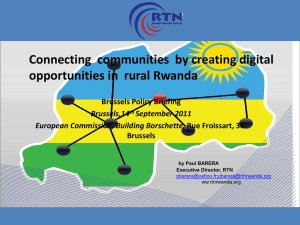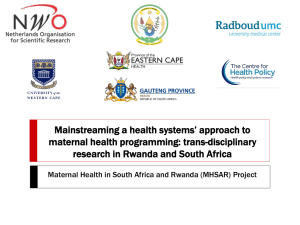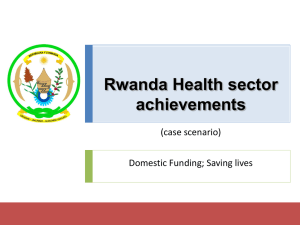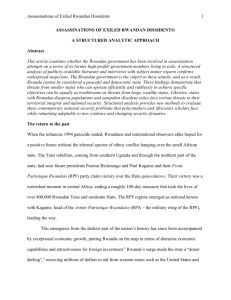Consultative Meeting with African Parliamentarians on ICPD
advertisement
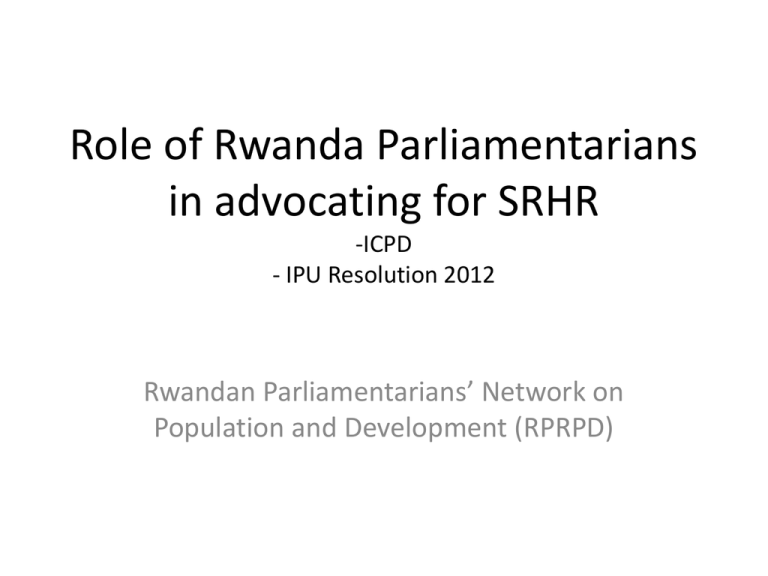
Role of Rwanda Parliamentarians in advocating for SRHR -ICPD - IPU Resolution 2012 Rwandan Parliamentarians’ Network on Population and Development (RPRPD) RPRPD and the ICPD Plan of Action The Rwandan Parliamentarians’ Network on Population and Development has been created in 2003 as a parliamentary way to implement the ICPD Plan of Action. ICPD states that the promotion of sexual and reproductive right is an essential instrument in the two main political and action fields: • Sustainable development • Poverty reduction • A group of 48 Deputies in 2003, of 76 committed parliamentarians (Senators and Deputies) today has done many achievements to meet ICPD agenda. The main objectives of RPRDD • Promote and protect fundamental rights of the entire population in general and those of women and children in particular; • Encourage greater access to education for all by fighting against gender disparities; • Support to the actions that contribute to the poverty reduction; • Fight the HIV/AIDS pandemic and other endemic diseases; • Promote family planning and sexual and reproductive health especially those of adolescents and young adults; Country Background: A pronatalist nation • High mortality rate due to lack of immunization and hygienic and sanitation measures • Colonial authority encourage many births for manpower in mining and big plantation of tea, coffee, cotton, cassava… • The Clergy encourage Christians to have many children and fill the world as God ordered Abraham; • 1994 Tutsi Genocide increase pro-natalist mindset to replace more than 1 million lost • There is no need to stabilize population Rwanda Population Pyramid 80 + 75-79 70-74 11,000,000 inhabitants (400 hab/km2) In Rwanda more than 50% of the population are under 18 Male Female 65-69 Women 52% Men 48% 60-64 55-59 50-54 45-49 40-44 More than 65% are under 25 35-39 30-34 25-29 20-24 15-19 10-14 5-9 <5 -25 -20 -15 -10 -5 0 5 10 15 20 Key Events, Rwanda National Family Planning Program, Central Level • 1999: Rwandan government begins to encourage the creation of community-based health insurance (mutuelles de sante) • 2002/2003: Qualitative assessment of family planning in Rwanda conducted, Rwandan Parliamentarians’ Network on Population and Development formed (RPRPD) • 2003: First National Reproductive Health Policy signed by the Minister of Health • 2006: National FP policy and its five-year strategies (2006-2010)produced by MOH; initiation of FP secondary health posts Key Events, Rwanda National Family Planning Program (Cont’d) • 2007: Government declares family planning to be a development priority; Economic Development and Poverty Reduction Strategy (2008-2012) emphasizes importance of FP and sets target of 70% CPR by 2012 • 2011: Rwanda Family Planning Policy and Family Planning Strategic Plan, both for 2012-2016, and National Adolescent Sexual & Reproductive Health Policy and Strategic Plan, 2011-2015, all developed with stakeholders Role of parliamentarians in advocating for SRHR • Stage 1: awareness that the reproductive health is a priority for the reduction of poverty and for a sustainable development (RPRPD in 2003); • Stage 2: Field visits and discussion with the population and all stakeholders, organizing public meeting and inform people on the importance of the issue and gather their interest • Stage 3: Forming alliances with public interest groups Religious and Civil society Students (University & secondary level) Local administrative authorities (executive secretaries of sectors), Mayors. • Stage 4: Persuading other legislative members to take up the cause, to vote laws or asking for a public hearing • Stage 5: Using all form of media (radio, television, newspapers • Stage 6: raising funds or other resources to support (government, UNFPA, UNICEF, DFID) Results: Need of services Reproductive health : National Priority Total Fertility Rate : a rwandan woman has an average of 4.6 Children during her reproductive life; the CPR of Urban and rural woman are 3.4 and 4.8 respectively Rwanda CPR increase MM Decrease Rwanda Decrease in maternal mortality Rwanda increase in CPR Rwanda 19922010 50 1200 45 45 1071 40 1000 35 30 CPR Trend in Rwanda 1992-2010 20 15 10 800 27.4 25 12.9 5 750 600 487 10.3 400 4.3 0 Year 1992 Year 2000 Year 2005 Year 2007 Year 2010 200 0 Year 2000 year 2005 Year 2010 Rwanda Decrease in maternal mortality Use of Modern Contraceptive Methods Percentage of women in union utilizing any contraceptive method Fertility Trends CPR for women of reproductive age (15-49 years old) for the 3 year period preceeding the Demographic and Health Survey (DHS) 2010 Rwanda Gross Domestic Product (GDP) 2001-2010 Trends in Maternal Health 94 96 98 69 69 52 39 Antenatal care 45 30 Delivery assisted by skilled Delivery in a health facility provider RDHS 2005 RIDHS 2007-08 RDHS 2010 Trends in Child Mortality Deaths by 1,000 live births Vaccination of children aged 12-23 months Trends in immunization coverage Percentage of children aged 12-23 months fully vaccinated FP/RH in Rwanda Law FP/RH in Rwanda Law: Maputo Protocol • June 24th, 2004 Ratification of The Maputo Protocol to the African Charter on Human and Peoples' Rights and the Rights of Women in Africa with reservation on its Art 14.2.c) • Presidential Order No 05/01 of May 2012 lifting the reservation issued by the Republic of Rwanda on art. 14.2 c Art 14: Health and Reproductive Health 2.c “protect the reproductive rights of women by authorizing medical abortion in cases of sexual assault, rape, incest, and where the continued pregnancy endangers the mental and physical health of the mother or the life of the mother or the foetus”. FP/RH in Rwanda Law Penal Code voted on April 4th, 2012 • • • • Article 165: Exemption from criminal liability for abortion 1° when a woman has become pregnant as a result of rape; 2° when a woman has been subjected to forced marriage; 3° when a woman has become pregnant due to incest in the second degree; • 4° when the continuation of pregnancy seriously jeopardizes the health of the unborn baby or that of the pregnant woman. FP/RH in Rwanda Law Penal Code voted on April 4th, 2012 • Article 166: Requirements for exemption from criminal liability…. • A medical doctor…. 1° after the medical doctor finds that continuation of the pregnancy would seriously endanger the health of the woman or that the unborn child cannot survive; • Art. 239: Any person who, on grounds of marriage, commits violence or harassment against his/her spouse because of the spouse’s decision to practice family planning shall be liable to a term of imprisonment of at least two (2) months but less than six (6) months. FP/RH in Rwanda Law • Draft reproductive health bill under the Standing Committee on social affairs. • This SRH Draft bill has been drafted by the Rwandan Parliamentarians’ Network on Population and Development (RPRPD) Challenges • Young population more than half of the Rwandan population is 18 year old; • More resource to invest in education and health services; • Cultural barriers which prevent family dialogue on SRHR; • Closing rural-urban gaps with regards to accessing modern family planning methods. The key opportunity: gender sensitive parliament How can we achieve this: 1. Increase the number and presence of women 2. Develop a legal framework for gender equality an gender sensitive work place policies 3. Mainstream gender equality in all the work of the parliament 4. Remind men of their responsibilities to achieve gender equality Community Work (Umuganda): anopportunities for a Mass mobilization on population issues How Can we keep momentum going on? Thank You! MURAKOZE CYANE Merci beaucoup!

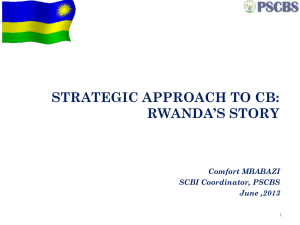
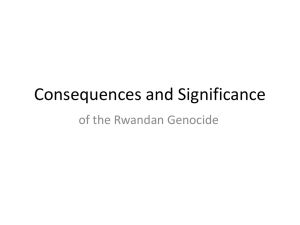
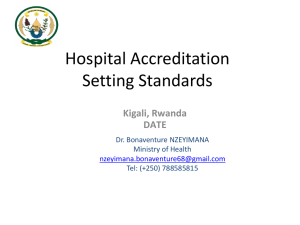
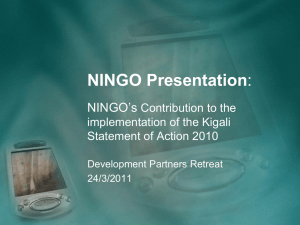
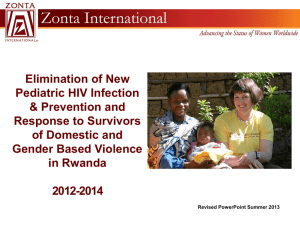
![Government of [Rwanda] - UNDP-UNEP Poverty](http://s2.studylib.net/store/data/005359438_1-2c42f5844b4637cd375e392bd4b49b8d-300x300.png)
